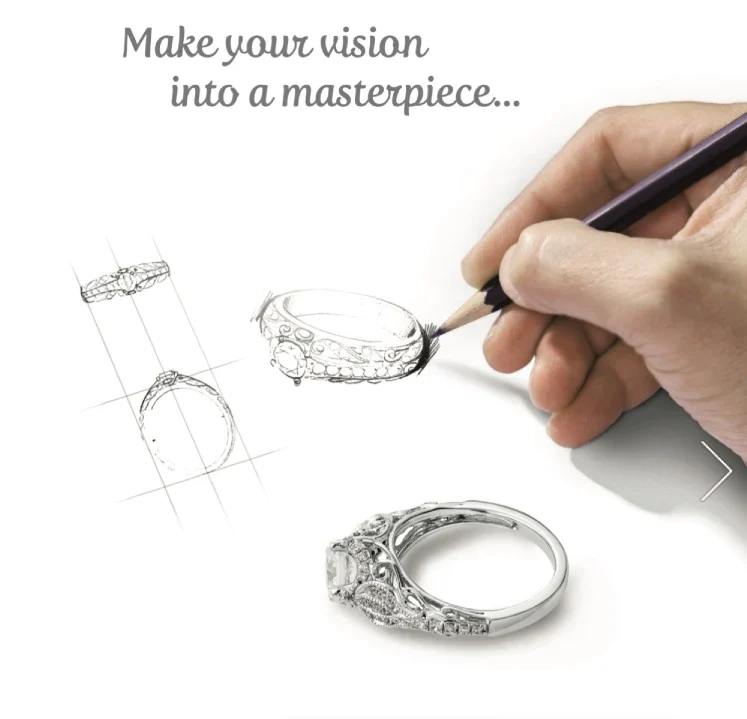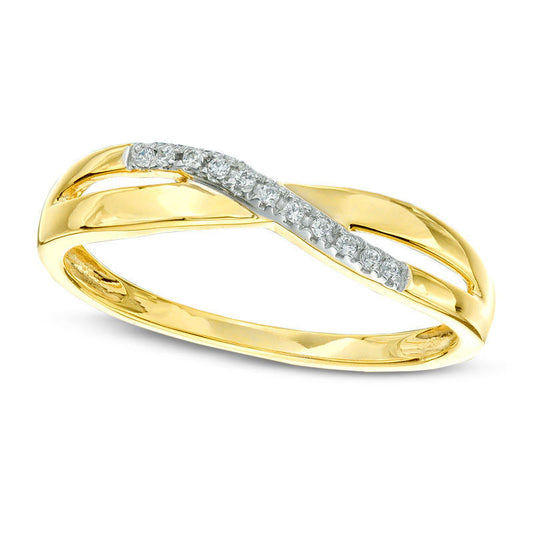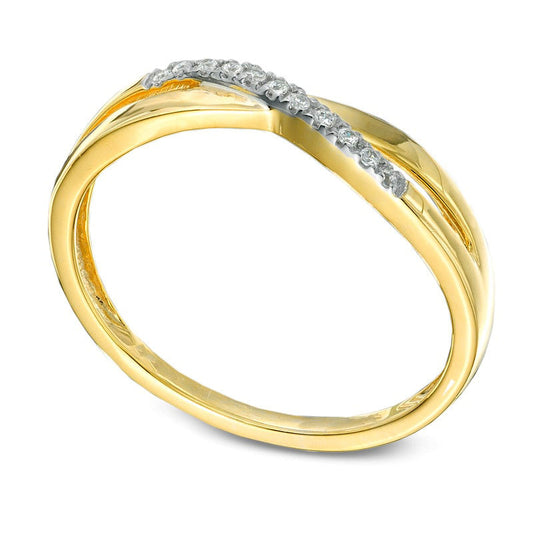Criss Cross Bands
When it comes to rings, there are so many options to choose from. As the world is evolving so are the traditional attachments to engagement and wedding rings.
This ring will work perfectly for a wedding ring and you can even get it in the classic solitaire for your engagement!
Do you want to know what ring this is?
How does it exude magnificence?
How to assemble yours?
Well, get ready to get all your questions on criss-cross bands answered.
What Are Criss Cross Bands?
This is a ring that is characterized by two shanks that cut across each other at a point. The side of the ring with the criss cross is the front of the ring, there can be two intersections so either the gemstone or you determine the front.
These bands can be made from one metal or more than one. It’s common to find these gorgeous rings in three precious metals.
One of such is this elegant three-gold alloy ring that features rose gold, white gold, and yellow gold metals from Goldia.
There are a lot of already made rings that feature a criss cross available for purchase. Seeing these rings for yourself is the only way to truly ascertain their beauty and elegance than for you to pick yours.
We will guide you through the process of getting a crisscross band before we do that. Let us take a look at some meanings that people attach to these rings and for what occasions.
Symbolism Of Criss Cross Bands
There’s almost nothing out there that has no symbolism. Even if there are, it’s certainly hard to find in the jewelry world.
Criss cross rings have remarkable symbolism attached to them. We’re going to first look at its symbolism as it relates to romantic relationships.
Criss cross rings hold a lot of meaning when it comes to love, a rather beautiful meaning.
As you know a criss cross ring has 2 – 3 shanks that cross each other at a point. This symbolizes that two different people have crossed paths and are now one. This makes it particularly a terrific choice for weddings!
A wedding is the joining of two people as one in marriage. What better way to show this than to get a ring that shows the exact thing!
We’re sure you can agree that criss cross rings are beyond perfect for a wedding ring.
If you’re looking for a wedding gift for someone in your life that’s getting married, again, criss cross bands are an amazing choice! Remember to get a pair for the couple too!
We relate that symbolism to romantic relationships because it fits the description perfectly. This meaning can also be attributed to promising rings.
If you don’t plan on getting married yet – or ever – then promise rings with a criss cross are an excellent choice! Get them for your special someone and you would be glad you did.
These rings are also a great choice for special milestones such as birthdays, graduations, and such.
The joining of the shanks together goes to show that the sum of its parts forms something greater than they were singly.
Once you have made the big decision to get yourself or someone else criss cross bands perhaps for a wedding, engagement, or birthday; the next thing is to carefully assemble your ring to your taste.
There’s the option of going to get rings that are already set with gemstones, metals, and everything. You can go ahead to check some of these. Who knows? You may find one that speaks to you.
If you’re looking to do this then you would need to check out some elegant criss cross bands we have at Goldia.
Building Your Criss cross Bands
The steps in building your rings are choosing:
-
The metal
-
The gemstones
-
The setting
These steps are not arranged in the order that they should go. If you feel you’re stuck go to other and make a choice. Just make sure to get everything settled before you begin the actual process of building your rings.
Choosing The Metal For Your Criss cross Bands
There is no special metal that is solely for these rings. It’s the same regular metals you would get for any ring that you will get for these as well.
Some of the metals we will be looking at are:
These metals are precious metals and are gorgeous in their way. That is why we have decided to talk about them because anyone you decide to pick will be an outstanding choice for your criss cross bands.
Gold
To be honest, there is hardly any jewelry store that you won’t find gold in. The beauty and elegance of this metal are just timeless! That’s so
because this metal has for many centuries – that’s right – been used to make jewelry.
When mankind first came across this gorgeous metal they were amazed. It was remarkably lustrous and malleable. Of course, humans' natural response was to use this metal to adorn themselves.
The metal was used by the monarchs; kings, queens, emperors, empresses, pharaohs; the wealthy; the powerful, and people of sorts.
Today, metal is readily available for anybody but its history still has it attributed to success, riches, luxury, good health, etc.
If you’re going to get yourself a gold ring you have four options initially:
-
Gold plated
-
Gold filled
-
Gold vermeil
-
Solid gold
Gold-plated criss cross rings simply feature a base core metal coated in pure gold. The precious metal is way too soft to use to create a whole ring. Not that it can’t be done but it is highly scratch-prone and certainly not durable.
For this reason, you have the option of getting your criss cross bands gold plated. A durable metal such as copper or zinc is used as the base metal and is covered in a coating of gold.
The coating may be thin or thick ranging from 1 – 3 microns. It is important to note that gold-plated rings tarnish easily. A couple of wears after purchase and you may begin to see the base metal in your ring.
Gold-filled criss cross bands, on the other hand, are much more durable than gold-plated ones. In fact, they have a life expectancy of up to 30 years, that’s a long time!
Their life expectancy is so because of the nature of these rings. It also features a base metal coated with gold. However, the gold is bonded to the metal at very high pressure and must make up 5% or 1/20 of the metal's total weight.
You don’t need us to tell you whether this is an amazing choice. We’re pretty sure you know the answer.
Gold Vermeil criss cross bands are another amazing choice. Just like the other two, gold vermeil features a base metal that is coated in gold. However, the base metal must be silver. If it’s not silver, it’s not gold vermeil; it’s that simple.
The silver can be in its pure form or otherwise alloyed as sterling silver. The coating has to be a minimum of 2.5 microns thick according to US regulations.
Gold vermeil will tarnish but it is less likely to do so than some gold-plated jewelry. It is the silver part of the ring that tarnishes and not the gold. Once the gold coating wears away, you begin to see signs of tarnishing.
Solid Gold is in reality a misnomer because only 100% gold will be classified as solid gold. Whereas, in this case, we are using solid gold to depict alloys of gold which to a percentage comprise other metals.
There are lots of gold alloys to pick from if you’re considering this for your criss cross bands. The most common choices though are three in number. They are:
-
Yellow gold
-
White gold
-
Rose gold
The first two gold alloys have a close resemblance to the color in their names. The last name, though, is not a color, the alloy has a pink to reddish color.
Whatever type of gold alloy you decide to get is up to you. The jewelry expert can recommend some for you but the decision is yours. You’re the one that’s going to wear the ring after all.
Next up we have a not-so-close cousin to gold and silver.
Silver
Whenever there’s an appearance of gold, there’s silver. It’s like they are a package deal. Silver is the direct opposite of gold colorwise.
Just like gold, silver has been used in jewelry for centuries. It’s a great choice for antique jewelry as well.
Silver is a grayish-white metal. It is also a very soft metal so it is commonly alloyed with other metals to increase its durability.
The other metals are usually present in the alloy at a small percentage. It is rather common to find a silver criss cross band with a hallmark of “925”. This simply indicates that 925 parts out of 100 are pure silver or 92.5% are pure.
Silver is highly prone to tarnishing but with proper maintenance can last a relatively long time.
Platinum
This metal is a white metal with remarkable luster. It can withstand polishing while retaining its shine.
A great property of this metal is that it is hypoallergenic – that is it does not cause any allergic reactions to human skin.
It’s not only jewelers that know of the usefulness of this metal. During the world wars in the 1990s, platinum was reserved for use in the military.
It’s a great choice and a magnificent alternative to silver for your criss cross bands.
Choosing The Gemstone For Your Criss Cross Bands
There are a variety of gemstones you can choose from. The most important aspect of picking your gemstone is to ensure its quality. This is done by looking at the 4 C's.
Before we look at these C's, here is a list of some gemstones that you can get:
-
Diamonds
-
Cubic Zirconia
-
Moissanite
-
Ruby
-
Sapphire
-
Emerald
-
Aquamarine
-
Amethyst
And lots more.
Now onto the 4 C's, they are
Cut
This is a crucial part of the gemstone selection process. Most people judge the quality of a diamond by the level of sparkle it gives off.
The sparkle is the gemstone’s fire, brilliance, or scintillation. It is the cut that determines this.
If a gemstone has adequate facets and is cut properly it will always give off remarkable brilliance. The only exception is if the gemstone is cut to show off clarity, a good example is the step cut.
Color
Gemstones are either colorless or colored. This determines the way their color is assessed.
Colorless gemstones or the ones that are supposed to be colorless follow a color grade scale. Gemstones higher up the scale will cost much more than the ones below. The color grading scale ranges from D – Z. D is completely colorless while Z shows a significant amount of color.
The colored gemstones are graded more simply. The deeper hues usually hold more value than a gemstone with a light hue.
Clarity
This is very important in your criss cross bands for a simple reason. Anybody you come across can easily get a close-up view of your fingers thus notice any inclusions.
If you don’t want that to happen then you’re going to have to pay close attention to the clarity grade of your gemstone. Luckily for you, clarity also had a grading scale; it ranges from “flawless” to “included”.
Carat
This is the net weight of whatever gemstone you will get. The type of ring, setting, and things like that typically determine the carat weight of
your gemstone. Still, you should get a carat that meets your taste, no matter how high or low.
Choosing The Setting For Your Criss Cross Bands
Now, it’s time to choose the setting for your criss cross bands. As you know, the criss cross is the center of attraction in these gorgeous rings. Still, when you’re adding gemstones you will have to select the setting that speaks to you.
The most common setting for criss cross rings would be the ones that have them set in the shank of the ring. Let’s take a look at some of these ring settings:
-
Bead Setting: This setting is commonly called pavé because of its nature. It typically features gemstones drilled into the shank that is held in place by tiny beads or prongs. This setting offers multiple tiny scintillations resulting in outstanding sparkle.
-
Channel Setting: In this setting, the gemstones are arranged in a groove in the shank. This setting looks like a channel, hence the name. It is an elegant setting for your gemstones as well.
-
Eternity Setting: Technically, the eternity ring is not considered a setting. However, we consider it one in this case because of its peculiar gemstone arrangement.
It features gemstones all around the shank of the ring. If you like the bling and sparkle of gemstones then this is a great choice for your criss cross rings.
As stated earlier, the above are settings that feature the gemstones in the shank of the ring. If you're not a fan of those, if you would rather go classic then there’s an option for you too!
-
Classic Solitaire: As most of us know this setting has for long been popular in engagement rings. They also work perfectly in criss cross bands.
You may be wondering how, it’s simple. The point of intersection of the two shanks holds the solitaire gemstone in place. It’s a very beautiful style for criss-cross bands. You should check one out.
When Should I Get Criss Cross Bands?
Now, that we have covered the aspect of building your rings to a large extent you may be wondering about the right time to get one.
There is no “right time” to get yourself these gorgeous rings. Although we stated earlier that the symbolism matches certain occasions. It’s up to you to hold on to those meanings or drop them.
How To Care For Criss Cross Bands
If you want your rings to continue looking as amazing as the day you got them, you will have to properly maintain them.
For the cleaning, use a soft brush dipped in mild soapy water and scrub, rinse, and pat dry.
For storage, simply store your rings away from other pieces of jewelry. This will prevent any scratches on the shank and gemstone.
We not so subtly hinted at the fact that these rings are perfect for engagements or weddings at the beginning of this article. If you are considering criss cross bands for that or something else, you should certainly check out the gorgeous collection we have at Goldia.





























